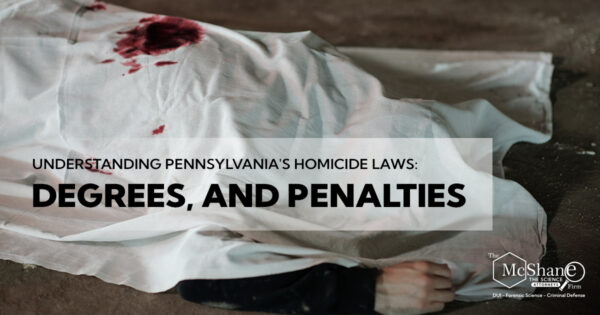In Pennsylvania, homicide is the act of one person causing the death of another. While all homicide cases involve the taking of a life, they are not all equal under the law. Pennsylvania law recognizes several degrees of homicide, each with its own set of criteria and penalties.

First-Degree Murder:
First-degree murder is the most serious charge of homicide and carries the harshest penalties. It is defined as an intentional killing committed with premeditation and malice. This means that the defendant planned to kill the victim and acted with the specific intent to do so. Premeditation can occur within a “twinkling of an eye” and need not be some long drawn out process. The penalty for first-degree murder in Pennsylvania is either life imprisonment without the possibility of parole or the death penalty.
Second-Degree Murder:
Second-degree murder is defined as a killing committed while the defendant was engaged as a principal or an accomplice in the perpetration of a felony. The penalty for second-degree murder in Pennsylvania is life imprisonment without the possibility of parole.
Third-Degree Murder:
Third-degree murder is a catch-all category that covers all other types of murder that do not fit the criteria for first- or second-degree murder. This can include situations where the defendant acted with reckless disregard for human life or when the killing occurred knowingly or without malice or without premeditation. The penalty for third-degree murder in Pennsylvania is 20 to 40 years in prison.
Voluntary Manslaughter:
Voluntary manslaughter is a lesser offense than murder and is typically charged when a defendant kills another person in the heat of passion or in response to provocation. It is defined as an intentional killing that occurs under circumstances that would cause a reasonable person to become emotionally or mentally disturbed. The penalty for voluntary manslaughter in Pennsylvania is up to 20 years in prison.
Involuntary Manslaughter:
Involuntary manslaughter is charged when a defendant causes the death of another person without intending to do so. This can happen when the defendant acts recklessly or with gross negligence. The penalty for involuntary manslaughter in Pennsylvania is up to 5 years in prison.
Understanding the different degrees of homicide and their associated penalties is important for anyone facing a homicide charge in Pennsylvania. It is essential to have an experienced criminal defense attorney on your side to help you navigate the complexities of the criminal justice system and to work towards the best possible outcome for your case.
